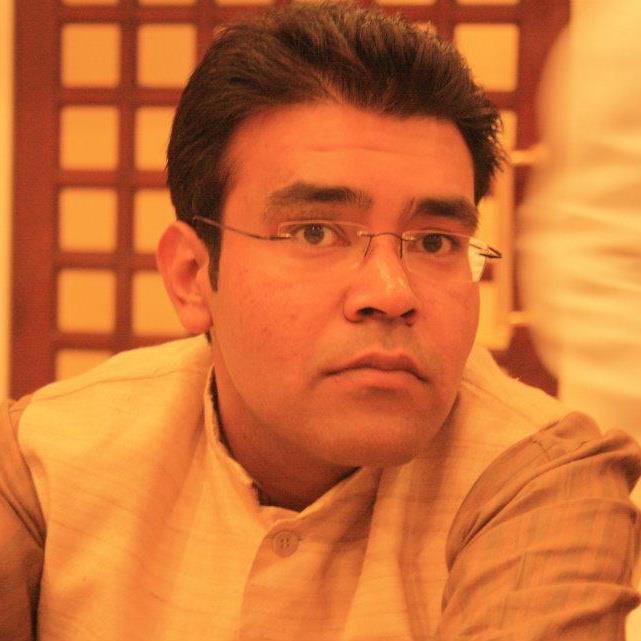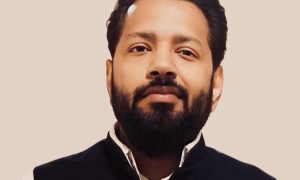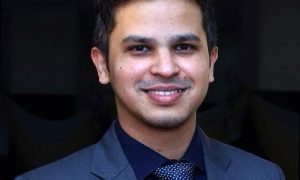Sameer Jain graduated from NLU, Jodhpur, in 2008. While still in college he had the opportunity to work as a Summer Employee at Goldman Sachs and after graduating he started working at Ernst & Young as a Consultant and later joined Luthra & Luthra Law offices as an associate. With all his work experience and expertise garnered from law firms in India and abroad he started his own corporate law firm, PAMASIS Law Chambers.
We asked him to share his thoughts about:
- What he learned from mooting and looking for sponsors
- Coming from a family of lawyers
- Getting a job with Goldman Sachs
Tell us a bit about your childhood.
My childhood was somewhat nomadic. Since my father was in a transferable job, we changed cities every three years. That meant new school, new friends and new surroundings. It was exciting to experience so many changes in the early days of my childhood. These experiences made me more acceptable and adaptable to change.
I have many lawyers and judges in my family. My father is a judge, my mother is a lawyer and my elder brother is also a lawyer. My cousins are also practising law. Apart from them, both my grandfathers were lawyers too.
That said, I would be lying if I told you that I always wanted to become a lawyer and nothing else. My earliest fantasy was to join the Indian Army and serve my country, but that couldn’t materialize due to some reasons. Besides, I was quite fascinated by technology and doing something in that field was also on my mind. At one point in time, while I was studying in the commerce stream in classes 11th and 12th, I was also participating in various other competitions, such as robotics.
How I decided to do law is an interesting story as well. Though consciously even till the last year of my school I had not decided to become a lawyer, but there was something about it which always fascinated me. I remember once going to the High Court with my mother and watching this lawyer argue an Intellectual Property matter very eloquently. He was extremely thorough with both the law and the technology involved. That was the day I decided to become a lawyer. Rest is history!
Do you think having family members or mentors with a legal background help in this profession?
[sociallocker] It certainly is helpful in the initial years, of both law school and the profession. At the law school, being surrounded by lawyers can be rather helpful as the terminology and the procedures being taught are already imprinted in the mind. Moreover, one has a subtle edge over the others since he/she is able to discuss the finer points of his curriculum in an informal environment, with the people who have the practical experience of the field. However, this is just a minor advantage. It is a lot more complicated on the professional front. At the end of the day, it becomes necessary for every student to burn the midnight oil to excel in studies.
Merely having family members or a mentor with a legal background may not be of much assistance. For example, if someone chooses to work with a professional law firm through college recruitment process after graduation, a family background in law may not help. You will have to go through the same gruelling schedule as anyone else who does not have a similar upbringing. On the other hand, if you choose to litigate, having someone who is already established in the profession and is a senior would only help you to get that initial push to get referral matters.
Furthermore, in this era of super specialization, having someone from a completely unrelated background may also be of no assistance to the new professional. I, for example, with a specialization in Taxation and Land Acquisition, have not benefitted from the fact that I have a number of lawyers and judges in my family.
However, I firmly believe that, irrespective of your background, what makes you succeed in this profession in the long run is your grit, determination, eye for detail and eloquence.
Tell us about your law school experience. Share some highlights from your college days that shaped you as a lawyer.
My five years at National Law University, Jodhpur were the most enjoyable and important years of my life. Apart from teaching me the fundamentals of law, my term at law school also taught me how to research, moot, debate, finish work within extremely tight deadlines, think on my feet, face challenges and also run for my life, if need be!
Jokes apart, half the things I learnt at law school, and which played a crucial role in my becoming what I am today, were not all part of the curriculum.
Compulsory moot courts in every law subject taught us how to conduct research on legal points, apply the case laws and argue even the weakest of matters. By the time I graduated, I had presented over 60 moot courts.
At NLU, Jodhpur, it was mandatory for everyone to make projects in every subject. This really groomed my research and drafting skills. Also, what I developed was an art to find information at the right place and in no time.
Crunching mid-term exams, snap tests, projects, moot courts, paper presentations and leisure in a short span of time not only taught me how to manage my time, but also enhanced my skills of multi-tasking, working in a team and being happy during hard times.
During my five years at law school, I was lucky to get many opportunities to travel around the world as well in within India to present papers and participate in moot courts. Travelling overseas required a lot of money and coming from not a very affluent background, it was obviously not affordable. Therefore, we resorted to requesting for sponsorship. The whole team approached lawyers, government and corporate houses and requested them to fund our trips. This exercise was particularly very important since it taught me four lessons:
1) Putting forth your point in the shortest possible manner and time, since senior lawyers did not have time to read or attend to long calls from a law student;
2) Art of approaching the otherwise seemingly unapproachable people. I remember faxing a request for sponsorship to the then Hon’ble Chief Minister of Rajasthan and following up with a call to her office every evening for three days. Finally, the Hon’ble Chief Minister did not only return my call and spoke to me she also sponsored our entire trip to Geneva. I realized that sometimes the difference between success and failure is that one step that one should never fail to take;
3) Art of persistence: getting a sponsorship was a long process and you had to be gracefully persistent with seniors till you got a final answer; and
4) Taking rejection in a stride. Ninety per cent of our calls/e-mails bore no fruits!
Do you think participating in extracurricular activities helps a student in the long run?
Yes, most certainly they do! I strongly encourage every law student to participate in as many conferences, debates and moot courts as he/she can. Not just for the academic gains that it brings, but also for expanding one’s network and wealth of experience.
At every conference, debate or moot court competition you meet people from different backgrounds, countries, ethnicities and age groups discussing/arguing on the same matter. It is fascinating to learn about the different interpretations in which a proposition can be given.
I, along with a friend, participated in a paper presentation competition organized by the TATA Institute of Social Sciences, Mumbai. The topic for that year’s paper was ‘Spaces’. It was amazing to see how the word ‘Spaces’ was differently interpreted by lawyers, management students, engineers and social sciences students.
These activities help to expand your horizon considerably.
What are the best internships that you did, and how did they help you to develop as a lawyer?
My best internship was at Goldman Sachs’s Legal Department in Bangalore. There were several things about that organization that made my stint most memorable and enriching. The legal team there was relatively new when I joined them for internship. There were only five members including the Vice President, Legal. Each member of the team supported the Goldman offices in the USA and EMEA region on specified areas, such as Commercial Contracts, ISDA Derivative Contracts negotiations, etc. I was hired to support the internal legal team and work directly under the VP, Legal. My role included drafting and vetting commercial contracts, researching on various laws such as labour laws, taxation and narcotics, and to support the business in any off-hand legal query that would arise.
What initially appeared to be a very regular legal internship turned out to be the most enriching three months, because my boss entrusted me with a lot of responsibility. I was independently sent for discussions with the CFO and the MD. I was given the opportunity to not only sit through live negotiations, but even encouraged to equally participate in them. I was also given a lot of freedom to undertake many tasks. But, most importantly, I got along rather well with the other members of the legal team — I made great friends. That helped me get a deep insight into their work and understand the broader scheme of things. Sometimes I also assisted them by working overtime. My internship was extended and I was called back to work with them once again as a ‘Summer Employee’.
Furthermore, apart from their legal work, Goldman is also known for its strong HR culture. They believe in developing human capital. Therefore, the organization goes an extra mile to take care of their employees irrespective of their role, position, responsibility or tenure. They treat you like a King/Queen — gourmet food, pick-and-drop service, separate security desk, lavish office, and a very handsome stipend!
By the end of my internship I realized that, as an intern, it is best to choose to work in a small team, as the learning opportunities are immense and you can take on more responsibility. However, in a big team, if you are not experienced you may just end up pushing papers and researching on case laws. A small team and the increased responsibility give you a chance to prove yourself, make mistakes and learn. You also end up making better interpersonal bonds.
How important do you think is an LL.M. for a lawyer who wants to practice as a corporate lawyer?
Doing an LL.M. does add to one’s educational qualification, understanding of the subject and networking, but I would not say that doing an LL.M. is an absolute necessity for everyone.
Though, I have observed a trend where students pursue an LL.M. course immediately after graduation. I think that it may be a wrong move. Doing an LL.M. soon after graduation may not yield the same result since it merely becomes an extension of the three/five year course. The purpose of an LL.M. is to give a specialized insight into the subjects of one’s choice. A fresh graduate may not be fully aware of his interests immediately after graduation. I recommend that an LL.M. course should be opted after gaining some years of work experience. The experience would help in making a more informed decision regarding the subjects one wishes to study further. I have seen instances where students have completed an LL.M. in Intellectual Property Law immediately after graduation and ended up practising Corporate Law once they started working. In such a situation the time and money spent in doing an LL.M. goes waste. Therefore, to avoid this, one should always make a decision only after gaining a few years of experience and then choosing the LL.M. course and college on the basis of the subject and area of law they wish to specialize in, from their career perspective.
I have still not done an LL.M. As explained earlier, I have consciously hopped from a corporate house to a consultancy firm to a law firm and then finally to doing litigation. I have explored all the avenues that the profession of law has to offer and zeroed down on the one most suitable for me. I now know which areas of law I would like to specialize in and from where. I may take up an LL.M. course in Dispute Resolution, whenever time permits.
Tell us about your first job.
My first recruitment after graduation was in the Tax and Regulatory Department of Ernst & Young Private Limited. My work there was very intense and gruelling. My manager loved his work and was addicted to perfection. I remember often working for 36-40 hours at a stretch, handling client meetings, making memos, and then attending tax classes in whatever time remained.
It is very different for a lawyer to work in a predominantly accounting firm. The team at E&Y comprised both chartered accountants (CAs) and lawyers. CAs are naturally great with numbers, and that meant working twice as hard to learn both law and accounting.
My stint at E&Y was a great learning experience. It was, single-handedly, responsible for shaping me as a professional and as a tax lawyer. I owe it completely to the strict regimentation of my manager and the then Tax Head.
The biggest challenges that I faced during this transformation were to learn the art of punctuality, approaching an issue from a practical and commercial standpoint, drafting and putting work before personal chores.
You are currently a Partner at Pamasis Law Chambers. How was your journey from a Law student to a Partner.
My journey from a law student to founding PAMASIS Law Chambers was like a rollercoaster ride. As I said before, I consciously chose to experience every role one can experience as a lawyer — as an in-house counsel, a consultant, in a law firm, an associate and a litigation lawyer. Playing all these roles helped me make the informed decision to do what I am doing today. There is nothing in my career which, I could say, happened by accident.
The milestones from being a law student to Partner, PAMASIS Law Chambers are as under:
- Internship and then summer employment at Goldman Sachs: This gave me a taste of working with one of the world’s best organizations very early. It helped me develop my professional skills even before graduation.
- Tax Consultant at Ernst & Young: My stint here shaped me as a thorough professional and taught me every detail about the subject. It also helped me realize that presentation and drafting is as important as knowing about law.
- Associate at Luthra & Luthra: This gave me an experience in both litigation and advisory role. It helped me choose what I love the most, i.e., litigation.
- Guest Faculty at Institute of Chartered Accountants of India: Teaching helped me feel liberated. The sense of sharing is very satisfying.
- Starting PAMASIS Law Chambers: All the above experiences made me decide that this is what I want to do — starting my own firm and using all the knowledge from these institutions to build an organization that is focused on providing great legal solutions.
How does one prepare oneself to be a lawyer at Goldman Sachs?
Goldman Sachs’s Legal team has one of the toughest selection procedures. Sometimes, interviews go on for as long as six months involving upto eighteen to twenty rounds with different people.
The first step is to apply for an open position, which is normally advertised on their website. If you pass the pre-screening, you will get a call from the HR for the first round of interview. After that, depending on the position you have applied for, there will be a mix of personal, audio-visual and telephonic interviews.
First and the foremost, prepare yourself well for the subject area for which you are giving the interview. Second, Goldman Sachs gives a lot of importance to thinking on the feet and, therefore, a lot of thought-provoking questions will be thrown at you. For example, why a manhole cover is round or how many petrol pumps are there in the New York City. They also ask a lot of analytical and probability-related questions, since that relates to the business of investment banking, such as: If I toss a coin 99 times and I get Heads all 99 times, what is the probability of getting Tails at the 100th toss. Most people get it wrong. It is called the Gamblers fallacy. Studying things like these would be an added advantage. Lastly, be thorough with the working of the organization, the latest happenings, deals, etc., related to the organization.
You left one of the finest law firms in the country and started your own law firm in 2012. What made you take this decision?
It wasn’t a very hard decision to leave Luthra & Luthra to start PAMASIS Law Chambers. The organization gave me a lot of experience and insight into the practice of law. The key is to make up your mind; but once that is done, acting on your decision is not easy. The journey will not be a cakewalk; but handling the situation with a firm mind can make the obstacles appear less difficult and less frustrating.
Starting my own practice was a decision that was taken over a long period of time. Everything was thought through and discussed with a lot of people. My family was extremely supportive and encouraged me throughout the journey.
What are the top three challenges of setting up your own law firm?
The top three challenges in setting up your own law firm are as under:
- Building a new client base: The biggest handicap of starting up a law firm is that you cannot advertise or engage in any kind of social media marketing. Thus, spreading the name of the firm is the biggest challenge. The firm is independent of the partners and has to develop its own independent image. That brand-building during the initial days is tough.
- Managing the processes: The processes that are in place in an already established firm are absent in a new setup, and it is a challenge to establish everything along with the other more important tasks, such as bringing in clients, executing the work, etc. Processes like new matter opening, filing, billing, etc., are crucial but often take a backseat during the initial few months.
- Accounting and Recovery: Setting up a new law firm involves a completely different system of accounting compared to an individual lawyer. During the initial days of establishment, this aspect remains completely ignored since billing is relatively less and the specialized manpower has not been hired. One realizes that invariably there will be one or two minor violations in the process. The trick is to focus on these as early as possible and rectify at the soonest. Recovery of invoices is another issue which a start-up faces. Normally, there is a separate desk to follow up on unpaid invoices, which is not present in a start-up law firm — one is always pulled between building fresh, long-lasting relationships and getting a bill paid. Recovery calls made by the same person who has executed the work becomes somewhat awkward for a start-up.
Do you take interns?
We do take interns. The most important qualities that we look for in an intern are: he/she should be a leader, problem-solver, self-motivated and daring. A good knowledge of law is something that can be acquired over a period of time.
An intern should send us an email at [email protected] with a cover letter specifying the duration of the internship that is being sought for. We encourage an intern to apply at least 3-4 months in advance.
What would be your advice to our young readers who may be aspiring to start their own law firms one day?
My advice to all the young readers who wish to start their own firm is not to rush into it just because you see a successful example in front of you. Give it a serious thought, chalk out a plan, think where the revenue will come from and save for at least a year with zero-revenue sustenance. I am not saying that do not take any risks. Take a calculated risk. Also, gain substantial experience before starting a firm. Obtain specialization in at least one area of law. Remember that once you have started a firm you will be at the top of it. There will be no one to review your work and make edits before sending it out to the client. This is a huge responsibility. Make sure you are equipped and experienced enough to send out documents and advice independently.
My last advice is very important. I received it from a close friend and it has come really handy. He told me to keep the fixed expenses at the minimum in the initial years. The most basic tendency is to immediately rent a fancy office, buy a bigger car and keep more staff as soon as the first stream of revenue starts flowing in. It is advised to curb this for the first two or three years. There are bound to be downturns; it is a service industry. Sustaining when the chips are low is the key to success in this business. Therefore, increase your fixed expenditure only when you are absolutely sure of the minimum revenue stream.
[/sociallocker]


























